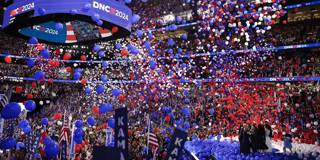The recently concluded Democratic National Convention in Chicago had everything: glitzy musical acts, rousing speeches, Oprah Winfrey, and effusive displays of familial love. Such sentimental gushing is an important part of the performance that US presidential candidates must put on to win over voters.
NEW YORK – The Democratic Party just put on a terrific show at their convention in Chicago. It had everything: glitzy musical acts, rousing speeches, religious devotion, floods of tears, promises of hope, moments of joy, uplifting patriotism, Oprah Winfrey, and lots and lots of balloons. Television commentators marveled at the way Vice President Kamala Harris “presented” herself: her smile, her body language, her voice, even her choice of clothing.

NEW YORK – The Democratic Party just put on a terrific show at their convention in Chicago. It had everything: glitzy musical acts, rousing speeches, religious devotion, floods of tears, promises of hope, moments of joy, uplifting patriotism, Oprah Winfrey, and lots and lots of balloons. Television commentators marveled at the way Vice President Kamala Harris “presented” herself: her smile, her body language, her voice, even her choice of clothing.